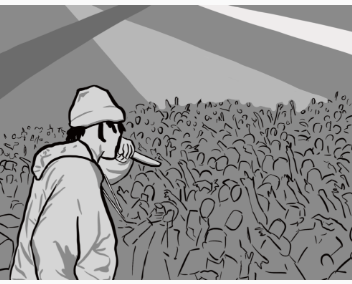The Astroworld fallout
November, 2021
Taking advantage of looser COVID-19 regulations, thousands have attended music festivals nationwide, finally re-entering the world of live entertainment. However, this shift back to normalcy gives no excuse to concert attendees to behave maniacally and threaten the lives of others; this behavior was exactly what was displayed during Travis Scott’s performance at the Astroworld music festival in Houston, Texas on November 5. Many of us have likely heard about this tragedy, which ended nine innocent lives and injured hundreds more. Social media tributes and news features have flooded our phones and captured our attention. But merely scrolling through Instagram and feeling angry is not enough. In order to cultivate a healthier fan culture, we should hold celebrities accountable and learn from this incident, making active efforts to ensure that this tragedy won’t happen again. To a generation that tends to idolize celebrities, the thought of seeing a favorite musician perform is exhilarating. This fanaticism prompts some young people to pay hundreds of dollars to see artists play packed stadiums filled with intense lights, loud music, and dizzying conditions.
But when fans rush to the stage and trample those in front of them to death, blinded by this obsessive fanaticism, we can clearly see that this unhealthy admiration for celebrities has gone too far. The desperate desire to get close to Travis Scott, to see him up close in-person and breathe the same air as him, cost the lives of nine people. The same booming music that was a source of joy for fans at the festival soon turned into a deafening source of fear for those being suffocated in the crowd. 50,000 people attended Astroworld, despite the pandemic and public health officials still advising against large gatherings. Many of these attendees weren’t supposed to be there in the first place; they didn’t purchase tickets and snuck in illegally. And Travis Scott himself didn’t have an issue with this. Prior to the concert, he posted a tweet that encouraged fans to sneak in, and thousands of young people flooded the venue as a result. The problem was exacerbated when the ticketing company sold more spots than the venue could take.
The situation worsened when Scott yelled at security to “get the f*** back,” starting a chant of “We want rage!” to incite the concert-goers. The people at the front of the crowd, being closest to the stage, feared for their lives with nowhere to escape. Organizers who had authority did nothing to control the havoc. People were literally stepping on each other, injuring hundreds as they danced to the music.
Travis Scott’s response was to continue performing, only briefly pausing for a moment to look into the crowd for a fan who had fainted, even as people were being carried out of the pit on stretchers. After footage of the calamity blew up on social media, Scott issued a hasty apology that seemed insincere, not addressing his role in encouraging fans. As a result, just as they rushed to the stage, avid fans surged to defend him under fire. Many made excuses such as claiming Scott couldn’t see those who were injured or saying that fans could have just left, ignoring or downplaying the fact that lives were unnecessarily lost.
Toxic fan culture prevents celebrities from being held accountable for their shortcomings, however severe. Protecting a public figure at any cost, even elevating them to a god-like status, is the equally toxic polar opposite of “canceling” individuals. Especially since they have impressionable minds receptive to all kinds of information, American youth often fall victim to this type of celebrity fandom. T
ravis Scott’s concert is just one example of the harm celebrity idolization can cause to our age group. When “stanning” celebrities evolves from a hobby into an obsession, it can hinder one’s ability to behave rationally. Think of PHS students who admire someone so much they aim to emulate their idol in almost every way, from the way they dress to the way they speak.
Maybe this doesn’t affect other people, but the behavior becomes significantly more concerning when that student is spending hours learning about the celebrity or thinking of them. This kind of high schooler is the exact type of person that would jump to the first line of defense when their role model is criticized. It’s not our job to tell anyone whom to follow online or whether or not they should attend a concert, but PHS students should be much more aware of the dangers that come with fawning over celebrities.
Happiness is an undeniably important part of people’s lives, and many may find it in the works of celebrities. As more and more people start going to in-person forms of entertainment like concerts, they’ve slowly begun to feel a sense of normalcy at last: Made In America, Governors Ball, Harry Styles’ Love on Tour, and more have been huge, exciting events attended recently. But, we need to consider our morals, values, and responsibilities as human beings when thinking about these events, not only about the content but about the idols who we admire. When showing your appreciation for some